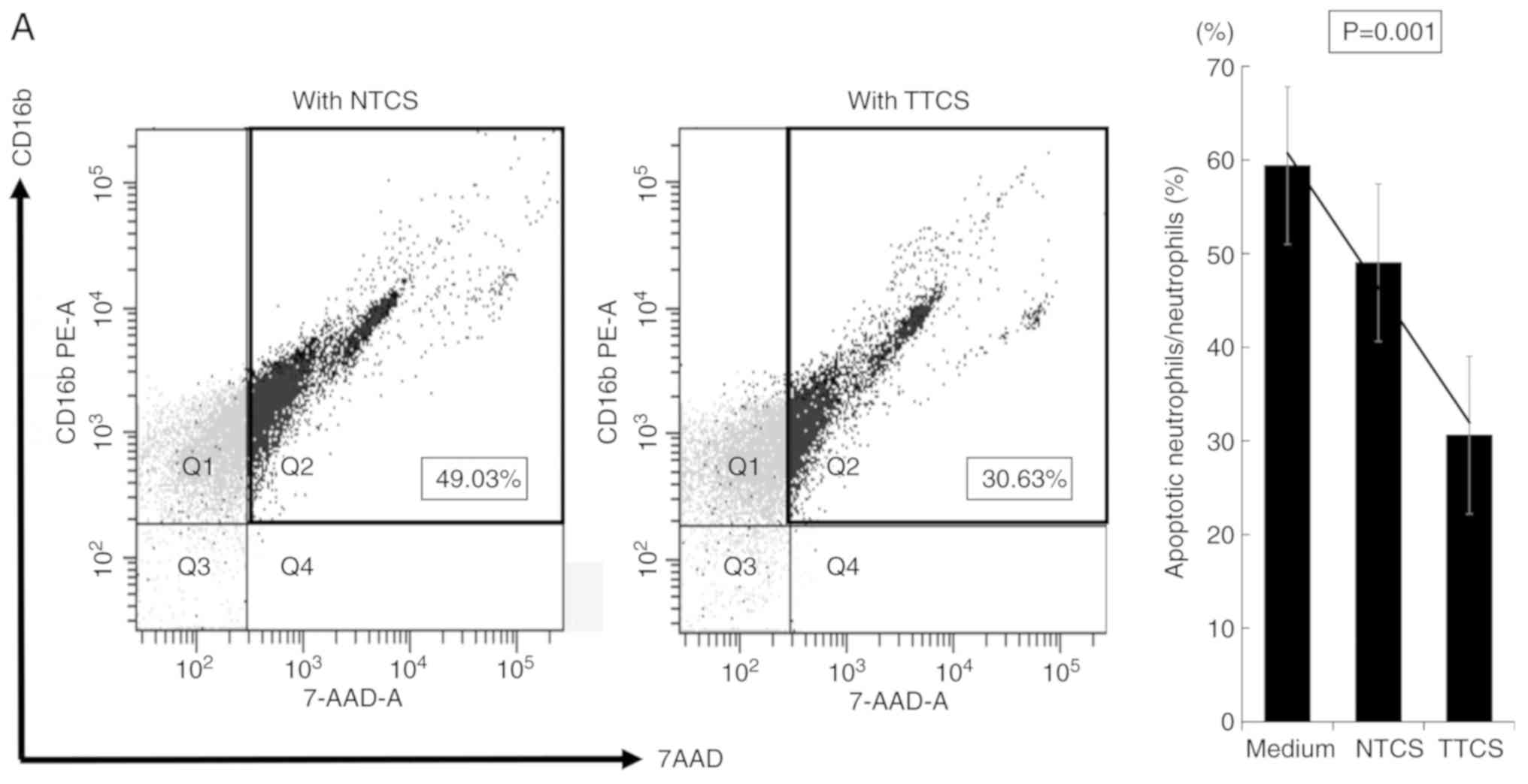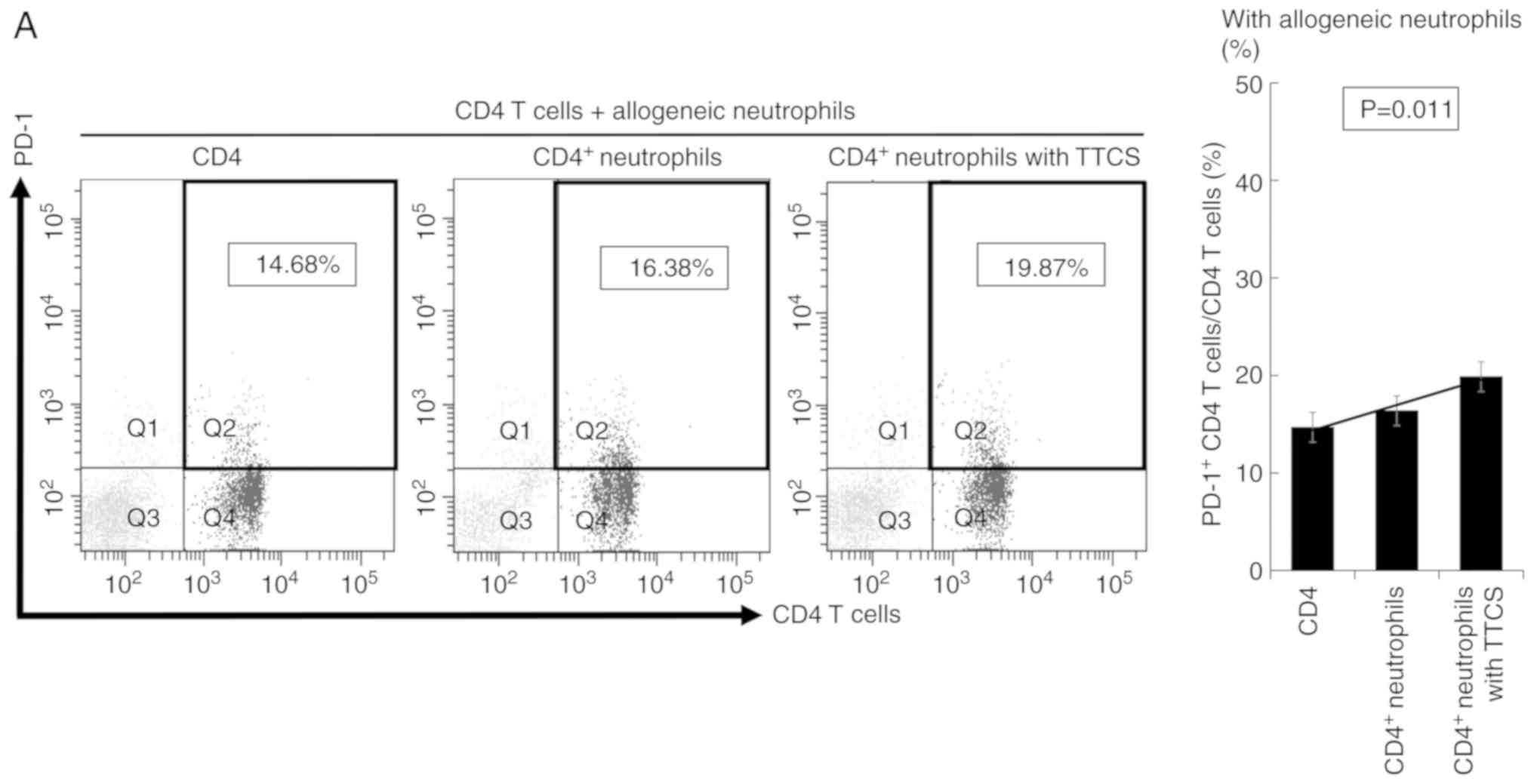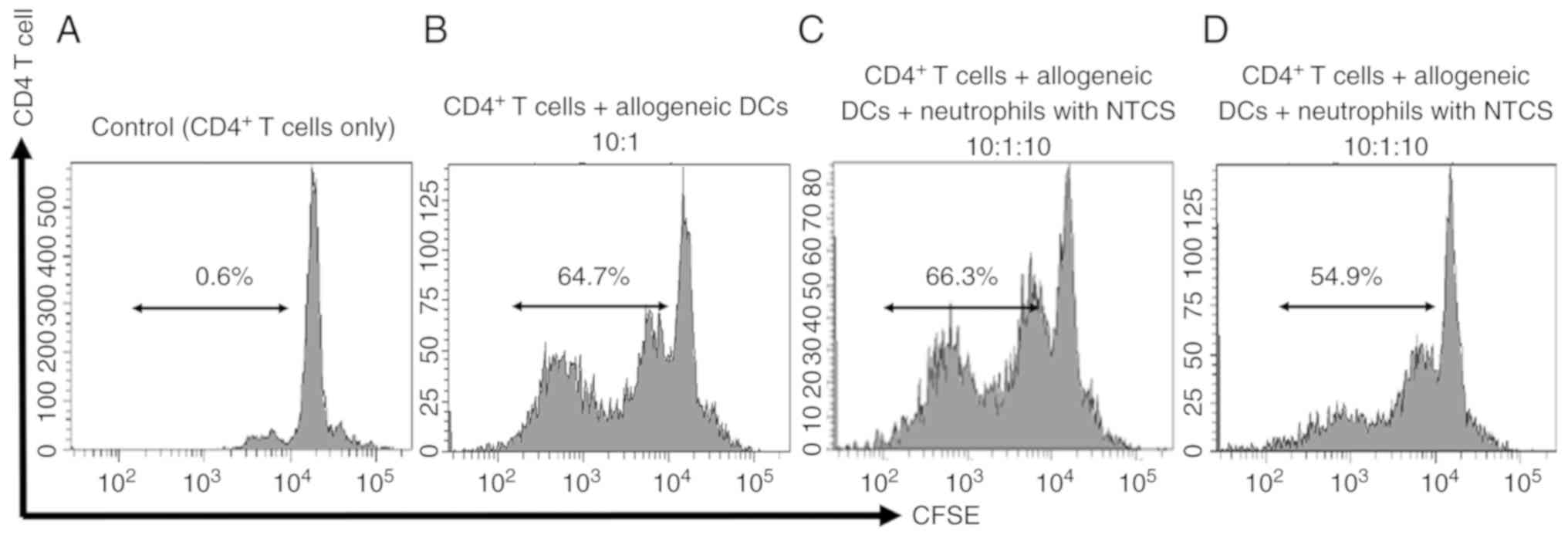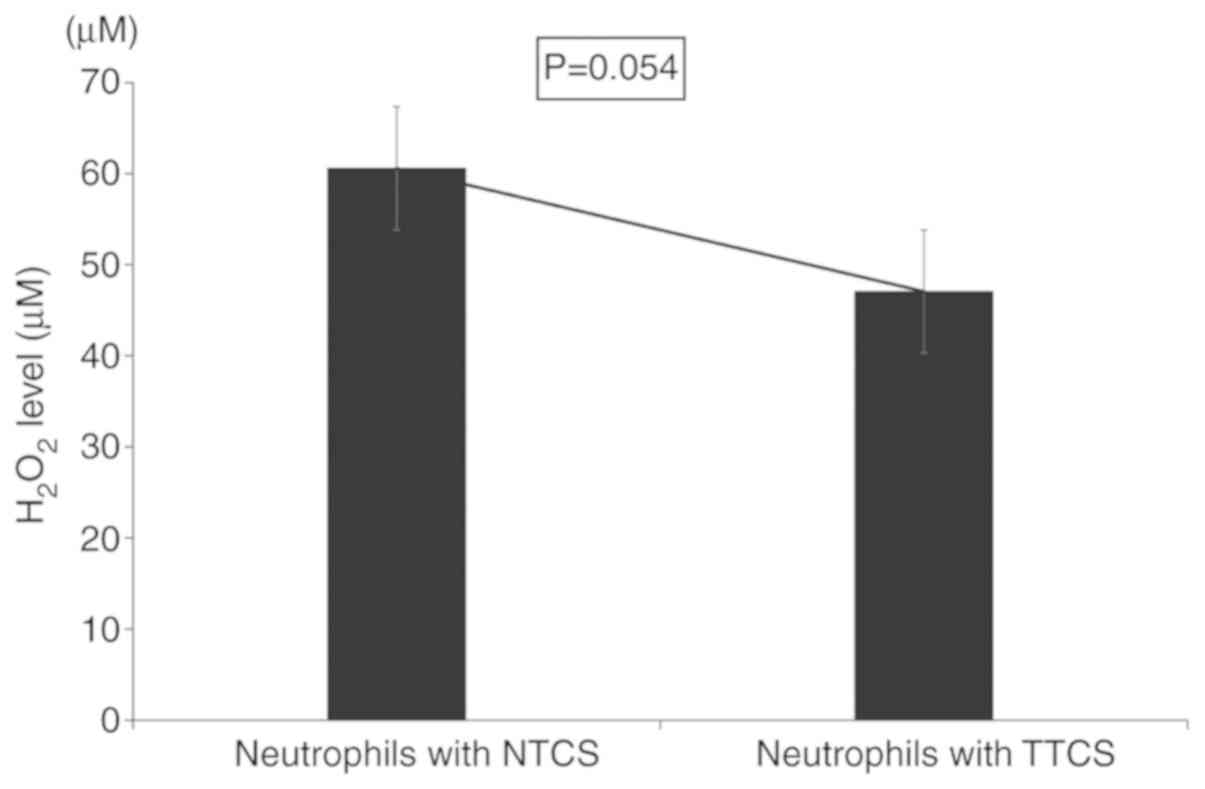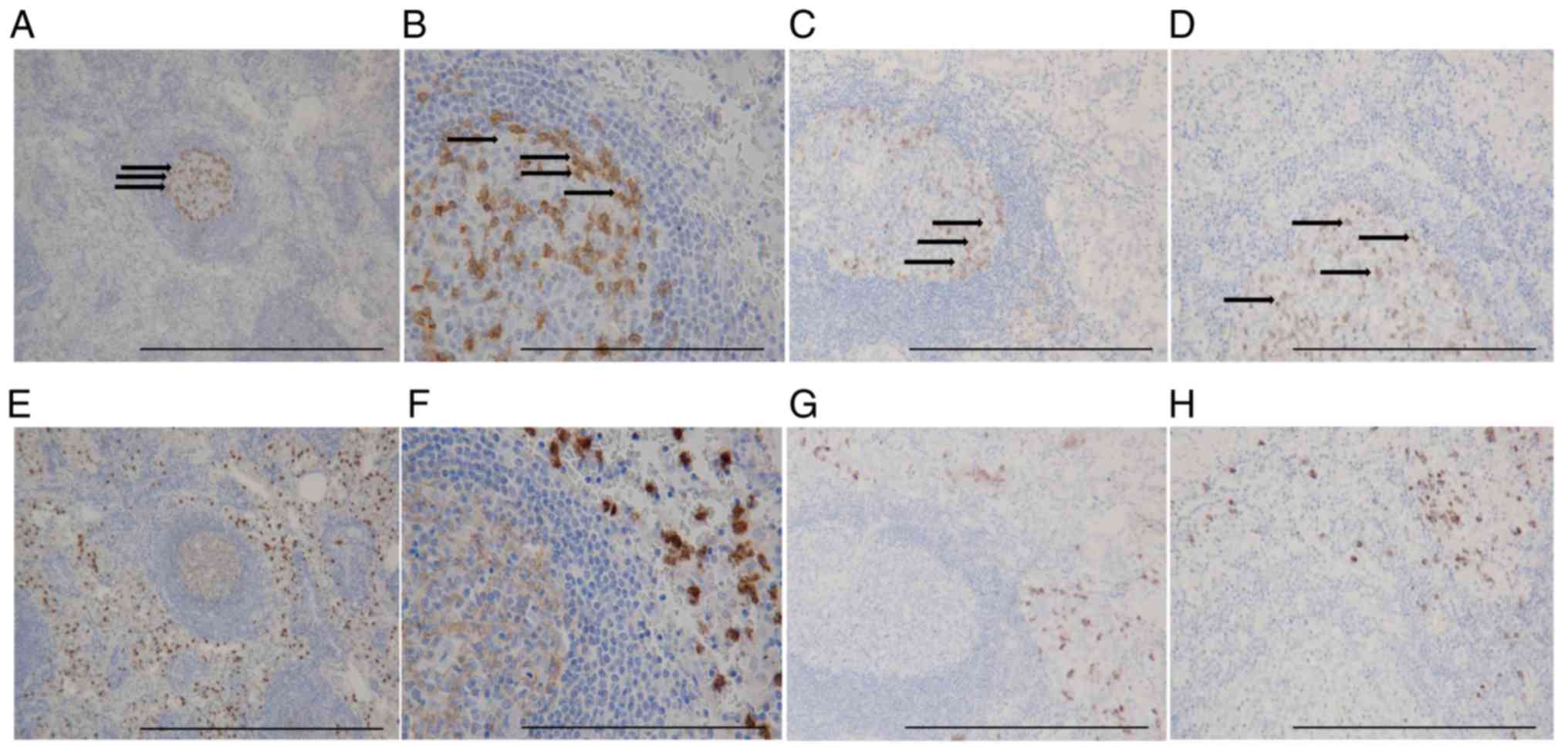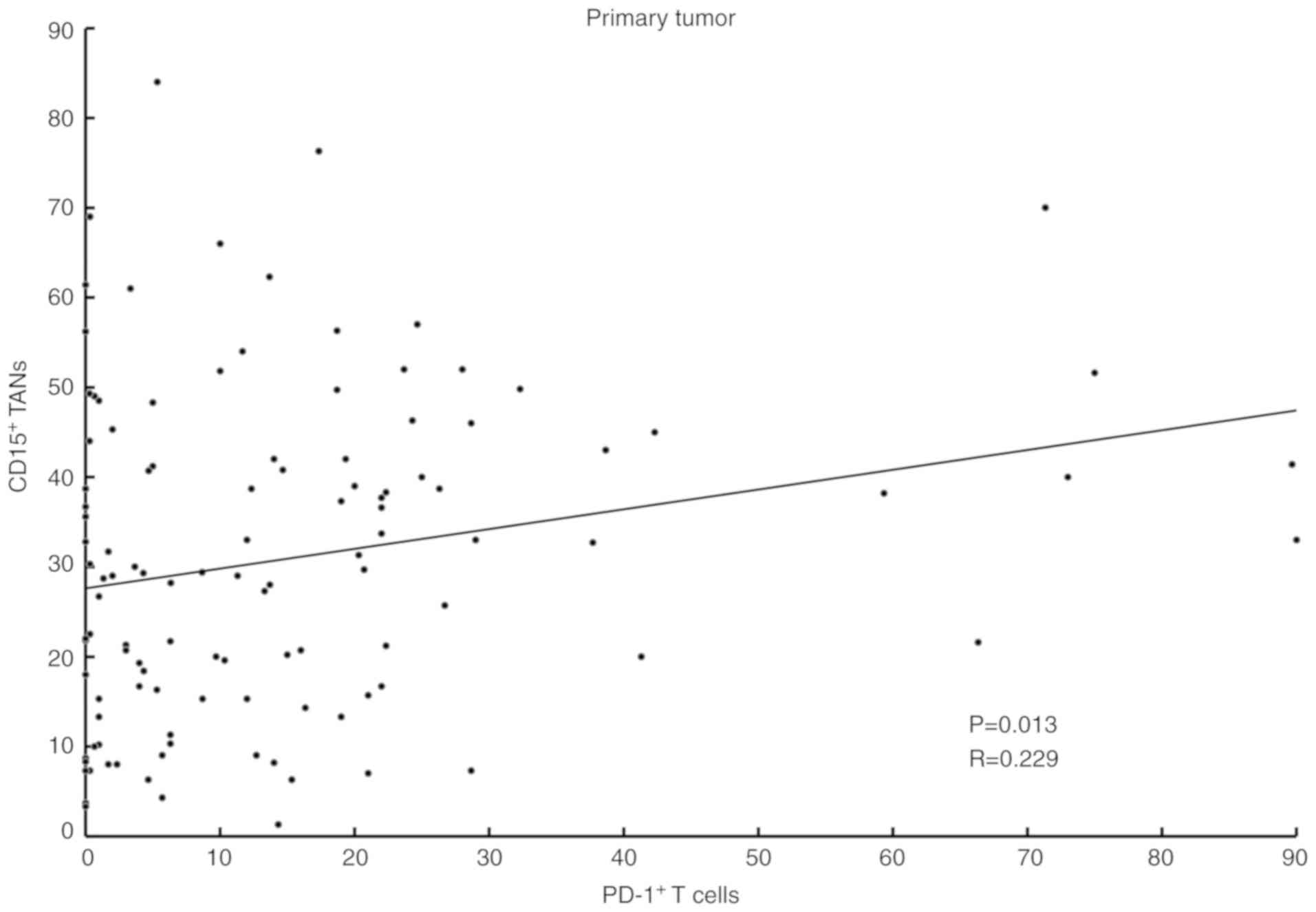|
1
|
Ajani JA, Lee J, Sano T, Janjigian YY, Fan
D and Song S: Gastric adenocarcinoma. Nat Rev Dis Primers.
3:170362017. View Article : Google Scholar : PubMed/NCBI
|
|
2
|
Mizrak Kaya D, Harada K, Shimodaira Y,
Amlashi FG, Lin Q and Ajani JA: Advanced gastric adenocarcinoma:
Optimizing therapy options. Expert Rev Clin Pharmacol. 10:263–271.
2017.PubMed/NCBI
|
|
3
|
Gu L, Chen M, Guo D, Zhu H, Zhang W, Pan
J, Zhong X, Li X, Qian H and Wang X: PD-L1 and gastric cancer
prognosis: A systematic review and meta-analysis. PLoS One.
12:e01826922017. View Article : Google Scholar : PubMed/NCBI
|
|
4
|
Galdiero MR, Garlanda C, Jaillon S, Marone
G and Mantovani A: Tumor associated macrophages and neutrophils in
tumor progression. J Cell Physiol. 228:1404–1412. 2013. View Article : Google Scholar : PubMed/NCBI
|
|
5
|
Kataoka K, Deleersnijder A and Lordick F:
Will molecular target agents enable the multidisciplinary treatment
in stage IV gastric cancer? Eur J Surg Oncol. 43:1835–1845. 2017.
View Article : Google Scholar : PubMed/NCBI
|
|
6
|
Hiramatsu S, Tanaka H, Nishimura J,
Sakimura C, Tamura T, Toyokawa T, Muguruma K, Yashiro M, Hirakawa K
and Ohira M: Neutrophils in primary gastric tumors are correlated
with neutrophil infiltration in tumor-draining lymph nodes and the
systemic inflammatory response. BMC Immunol. 19:132018. View Article : Google Scholar : PubMed/NCBI
|
|
7
|
Tokumoto M, Tanaka H, Ohira M, Go Y, Okita
Y, Sakurai K, Toyokawa T, Kubo N, Muguruma K, Maeda K, et al: A
positive correlation between neutrophils in regional lymph nodes
and progression of gastric cancer. Anticancer Res. 34:7129–7136.
2014.PubMed/NCBI
|
|
8
|
Rakic A, Beaudry P and Mahoney DJ: The
complex interplay between neutrophils and cancer. Cell Tissue Res.
371:517–529. 2018. View Article : Google Scholar : PubMed/NCBI
|
|
9
|
Aulakh GK: Neutrophils in the lung: ‘The
first responders’. Cell Tissue Res. 371:577–588. 2018. View Article : Google Scholar : PubMed/NCBI
|
|
10
|
Rosales C, Lowell CA, Schnoor M and
Uribe-Querol E: Neutrophils: Their role in innate and adaptive
immunity 2017. J Immunol Res. 2017:97483452017. View Article : Google Scholar : PubMed/NCBI
|
|
11
|
Fridlender ZG and Albelda SM:
Tumor-associated neutrophils: Friend or foe? Carcinogenesis.
33:949–955. 2012. View Article : Google Scholar : PubMed/NCBI
|
|
12
|
Hurt B, Schulick R, Edil B, El Kasmi KC
and Barnett C Jr: Cancer-promoting mechanisms of tumor-associated
neutrophils. Am J Surg. 214:938–944. 2017. View Article : Google Scholar : PubMed/NCBI
|
|
13
|
Ying HQ, Deng QW, He BS, Pan YQ, Wang F,
Sun HL, Chen J, Liu X and Wang SK: The prognostic value of
preoperative NLR, d-NLR, PLR and LMR for predicting clinical
outcome in surgical colorectal cancer patients. Med Oncol.
31:3052014. View Article : Google Scholar : PubMed/NCBI
|
|
14
|
Miyamoto R, Inagawa S, Sano N, Tadano S,
Adachi S and Yamamoto M: The neutrophil-to-lymphocyte ratio (NLR)
predicts short-term and long-term outcomes in gastric cancer
patients. Eur J Surg Oncol. 44:607–612. 2018. View Article : Google Scholar : PubMed/NCBI
|
|
15
|
Feng JF, Huang Y and Chen QX: Preoperative
platelet lymphocyte ratio (PLR) is superior to neutrophil
lymphocyte ratio (NLR) as a predictive factor in patients with
esophageal squamous cell carcinoma. World J Surg Oncol. 12:582014.
View Article : Google Scholar : PubMed/NCBI
|
|
16
|
Cortez-Retamozo V, Etzrodt M, Newton A,
Rauch PJ, Chudnovskiy A, Berger C, Ryan RJ, Iwamoto Y, Marinelli B,
Gorbatov R, et al: Origins of tumor-associated macrophages and
neutrophils. Proc Natl Acad Sci USA. 109:24919–2496. 2012.
View Article : Google Scholar
|
|
17
|
Zhou J, Nefedova Y, Lei A and Gabrilovich
D: Neutrophils and PMN-MDSC: Their biological role and interaction
with stromal cells. Semin Immunol. 35:19–28. 2018. View Article : Google Scholar : PubMed/NCBI
|
|
18
|
Pillay J, Tak T, Kamp VM and Koenderman L:
Immune suppression by neutrophils and granulocytic myeloid-derived
suppressor cells: Similarities and differences. Cell Mol Life Sci.
70:3813–3827. 2013. View Article : Google Scholar : PubMed/NCBI
|
|
19
|
Nywening TM, Belt BA, Cullinan DR, Panni
RZ, Han BJ, Sanford DE, Jacobs RC, Ye J, Patel AA, Gillanders WE,
et al: Targeting both tumour-associated CXCR2(+) neutrophils and
CCR2(+) macrophages disrupts myeloid recruitment and improves
chemotherapeutic responses in pancreatic ductal adenocarcinoma.
Gut. 67:1112–1123. 2018. View Article : Google Scholar : PubMed/NCBI
|
|
20
|
Kato Y, Yashiro M, Noda S, Tendo M,
Kashiwagi S, Doi Y, Nishii T, Matsuoka J, Fuyuhiro Y, Shinto O, et
al: Establishment and characterization of a new hypoxia-resistant
cancer cell line, OCUM-12/Hypo, derived from a scirrhous gastric
carcinoma. Br J Cancer. 102:898–907. 2010. View Article : Google Scholar : PubMed/NCBI
|
|
21
|
Immune suppression and infections. Keeping
a balance. Mayo Clin Health Lett. 31:4–5. 2013.
|
|
22
|
Ostanin DV, Kurmaeva E, Furr K, Bao R,
Hoffman J, Berney S and Grisham MB: Acquisition of
antigen-presenting functions by neutrophils isolated from mice with
chronic colitis. J Immunol. 188:1491–1502. 2012. View Article : Google Scholar : PubMed/NCBI
|
|
23
|
Cassatella MA: Human mature neutrophils as
atypical APC. Blood. 129:1895–1896. 2017. View Article : Google Scholar : PubMed/NCBI
|
|
24
|
Singhal S, Bhojnagarwala PS, O'Brien S,
Moon EK, Garfall AL, Rao AS, Quatromoni JG, Stephen TL, Litzky L,
Deshpande C, et al: Origin and role of a subset of tumor-associated
neutrophils with antigen-presenting cell features in early-stage
human lung cancer. Cancer Cell. 30:120–135. 2016. View Article : Google Scholar : PubMed/NCBI
|
|
25
|
Wang TT, Zhao YL, Peng LS, Chen N, Chen W,
Lv YP, Mao FY, Zhang JY, Cheng P, Teng YS, et al: Tumour-activated
neutrophils in gastric cancer foster immune suppression and disease
progression through GM-CSF-PD-L1 pathway. Gut. 66:1900–1911. 2017.
View Article : Google Scholar : PubMed/NCBI
|
|
26
|
Zhang X and Xu W: Neutrophils diminish
T-cell immunity to foster gastric cancer progression: The role of
GM-CSF/PD-L1/PD-1 signalling pathway. Gut. 66:1878–1880. 2017.
View Article : Google Scholar : PubMed/NCBI
|
|
27
|
Sakimura C, Tanaka H, Okuno T, Hiramatsu
S, Muguruma K, Hirakawa K, Wanibuchi H and Ohira M: B cells in
tertiary lymphoid structures are associated with favorable
prognosis in gastric cancer. J Surg Res. 215:74–82. 2017.
View Article : Google Scholar : PubMed/NCBI
|
|
28
|
Tamura T, Ohira M, Tanaka H, Muguruma K,
Toyokawa T, Kubo N, Sakurai K, Amano R, Kimura K, Shibutani M, et
al: Programmed death-1 ligand-1 (PDL1) expression is associated
with the prognosis of patients with stage II/III gastric cancer.
Anticancer Res. 35:5369–5376. 2015.PubMed/NCBI
|
|
29
|
Abbas M, Steffens S, Bellut M, Becker JU,
Großhennig A, Eggers H, Wegener G, Kuczyk MA, Kreipe HH, Grünwald
V, et al: Do programmed death 1 (PD-1) and its ligand (PD-L1) play
a role in patients with non-clear cell renal cell carcinoma? Med
Oncol. 33:592016. View Article : Google Scholar : PubMed/NCBI
|
|
30
|
Hino R, Kabashima K, Kato Y, Yagi H,
Nakamura M, Honjo T, Okazaki T and Tokura Y: Tumor cell expression
of programmed cell death-1 ligand 1 is a prognostic factor for
malignant melanoma. Cancer. 116:1757–1766. 2010. View Article : Google Scholar : PubMed/NCBI
|
|
31
|
Bowers NL, Helton ES, Huijbregts RP,
Goepfert PA, Heath SL and Hel Z: Immune suppression by neutrophils
in HIV-1 infection: Role of PD-L1/PD-1 pathway. PLoS Pathog.
10:e10039932014. View Article : Google Scholar : PubMed/NCBI
|
|
32
|
Cheng Y, Li H, Deng Y, Tai Y, Zeng K,
Zhang Y, Liu W, Zhang Q and Yang Y: Cancer-associated fibroblasts
induce PDL1+ neutrophils through the IL6-STAT3 pathway
that foster immune suppression in hepatocellular carcinoma. Cell
Death Dis. 9:4222018. View Article : Google Scholar : PubMed/NCBI
|
|
33
|
Galdiero MR, Varricchi G, Loffredo S,
Mantovani A and Marone G: Roles of neutrophils in cancer growth and
progression. J Leukoc Biol. 103:457–464. 2018. View Article : Google Scholar : PubMed/NCBI
|
|
34
|
Huang X, Pan Y, Ma J, Kang Z, Xu X, Zhu Y,
Chen J, Zhang W, Chang W and Zhu J: Prognostic significance of the
infiltration of CD163+ macrophages combined with
CD66b+ neutrophils in gastric cancer. Cancer Med.
7:1731–1741. 2018. View Article : Google Scholar : PubMed/NCBI
|
|
35
|
Mishalian I, Bayuh R, Zolotarov L, Levy L,
Singhal S, Albelda SM and Fridlender ZG: Tumor-associated
neutrophils (TAN) develop protumorigenic properties during tumor
progression. Cancer Immunol Immunother. 62:1745–1756. 2013.
View Article : Google Scholar : PubMed/NCBI
|
|
36
|
Sagiv JY, Michaeli J, Assi S, Mishalian I,
Kisos H, Levy L, Damti P, Lumbroso D, Polyansky L, Sionov RV, et
al: Phenotypic diversity and plasticity in circulating neutrophil
subpopulations in cancer. Cell Rep. 10:562–573. 2015. View Article : Google Scholar : PubMed/NCBI
|
|
37
|
Fridlender ZG, Sun J, Kim S, Kapoor V,
Cheng G, Ling L, Worthen GS and Albelda SM: Polarization of
tumor-associated neutrophil phenotype by TGF-beta: ‘N1’ versus ‘N2’
TAN. Cancer Cell. 16:183–194. 2009. View Article : Google Scholar : PubMed/NCBI
|















